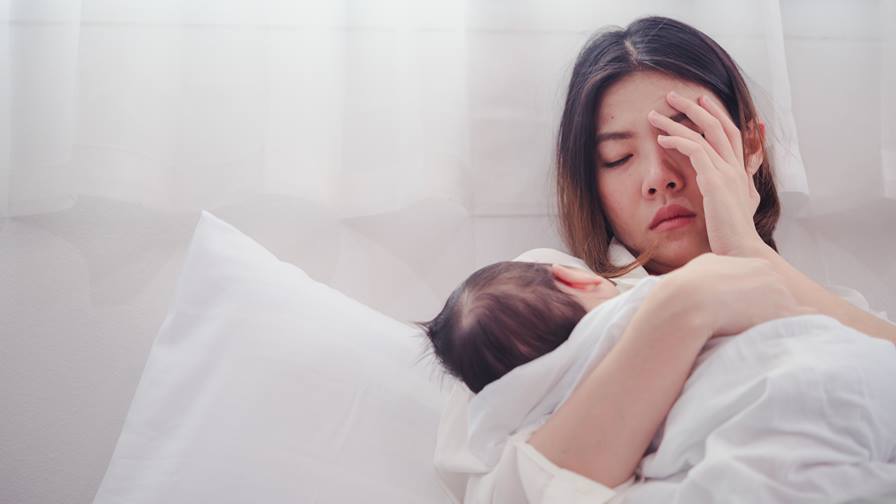
Scenario 1: Postpartum Depression vs Baby Blues
“I carried the baby for nine months, nourished it each day, and longed for when I would finally see their little face. But now that the baby is out, I’m kinda sad and irritated all the time.”
Explain baby blues vs postpartum depression
What are Baby Blues?
Are you a new mother experiencing a whirlwind of similar thoughts ever since delivery? You are not alone. New mammas very commonly feel unexpectedly and overwhelmingly sad, irritable, restless, anxious, teary, and miserable. This phenomenon is called “baby blues” and as the name suggests, baby blues give you random blues post-childbirth.
Why do baby blues happen?
A highly ironic phenomenon, baby blues happen to take place right when a mother is supposed to be living the best days of her life – after finally giving birth to the baby she cherished for. However, this is only because as a body that transformed from being a woman to being a mother, it has undergone some major changes.
Post-birth, rapid hormonal changes take place. Your estrogen and progesterone hit the rock bottom which causes all the overbearing sadness. All of those hormonal changes when clubbed with new mom anxiety, anticipation, fear of the unknown, and a full-blown whirlwind of emotions, you ought to feel a little blue. Cut yourself some slack, mamma!
When Do Baby Blues Get Over?
Typically, baby blues begin to diminish a couple of weeks after childbirth once you heal from the delivery after-effects, have taken enough rest, and as you start getting used to your newborn.
How to get rid of Baby Blues ?
Having the will to feel better is step 1 to getting rid of the baby blues. If you have a positive outlook and have decided to feel better, you will! Here are some tips on how to free yourself from the baby blues-
1. Cut yourself some slack
We are sorry, there really was no presidential way to put this forward. As a new mom, it is common for women to feel like they are responsible for everything happening in the world. You want to be the perfect wife, the perfect mom, the perfect daughter, the perfect colleague – all of that while accommodating a new life in your house. That is not how it works ladies! Be a little easy on yourself and prick the bubble of perfection. You do the best you can and remember, there’s nothing to be guilty about. Moms can make mistakes too!
Pro tip: Treating yourself with quick me-time manicures, blow drys, and ice cream tubs could be a good idea too!
2. Ask for help
It is absolutely okay to reach out to your friends, family for support and nobody is going to judge you for that. Do not try to do everything alone and by yourself. If you need help with the laundry or could make use of some advice on a project from a colleague at work – ask for it!
3. Go outdoors!
Life does get a little too busy and at each occasion with even ten minutes of spare time at disposal, indulging in a quick nap might feel like a treasure. However, as good as that nap might be, you have no idea what you’re missing outdoors! Get out of the dirty pajamas, spend some time on yourself, pick out a clean pair of tights, and try to get out of the house at least once a day, even if it is for a 15-minute walk. The walks could also be a good time of the day to have a one-on-one with your little one!
4. Exercise
Exercising post-delivery is highly recommended because it boosts the endorphins (happy hormones), giving your mind and body a high. Some postpartum exercise groups and classes also let you bring your baby with you!
5. Release your emotions
All said and done, do not hold anything back in you. Cry or laugh or smile or howl as much as you want to. Listen to nice music, watch some episodes of your favorite sitcom, give yourself at least half the care you give your baby and you will do good mamma!
Scenario 2: Postpartum Depression vs Baby Blues
“My baby is already 2 months old and I am still so irritable, sad, and angry all the time. Am I still suffering from baby blues?”
What is Postpartum Depression?
You have already given birth, the hormones have settled, you have taken enough rest, have gotten used to the baby, and have completely healed from post-delivery effects. However, anxiety, restlessness, sadness, fear, irritability, mood swings, and anger still lingers.
Sometimes, when the symptoms of baby blues last longer than a couple of weeks it might signal a common condition called postpartum depression (PPD). Postpartum depression can begin at any time within the first three months post-delivery. Typically, moms who have had a history of depression in the family are more vulnerable to slipping into PPD. Besides, external factors like a troubled marriage, financial insecurity, difficult pregnancy, complicated birth, or chronic illness can also expose a woman to PPD.
Postpartum depression poses more severe symptoms as compared to baby blues and typically lasts longer than a few weeks. Some common symptoms include-
- Hopelessness, helplessness, loss of desire to take care of oneself or the baby
- Overpowering fatigues
- Insomnia
- Eating disorders
- Panic attacks
- OCD behavior
- The feeling of failure as a mother
- Unexplainable guilt
- Memory problems
- Hallucinations or delusions
If you are a new mother who has been feeling the aforesaid symptoms and is persistently beating yourself up for unexplainable reasons, it is time to reach out to your doctor. Postpartum depression is highly treatable. All it takes is professional help and some potential breast-feed-safe-antidepressants.
How to Get Rid of Postpartum Depression?
Therapy and professional consultation are the most recommended and effective ways of freeing yourself from postpartum depression, you can also additionally follow the same aforementioned for getting rid of baby blues. Just take one day at a time and have faith in the fact that most women recover completely from postpartum depression. The only bit is to ensure that your PPD is diagnosed- even if you might have the slightest of reasons to believe that you are suffering from PPD, reach out for help immediately.
The Bottom Line: How to Tell The Difference Between Baby Blues and Postpartum Depression?
Timeline: Baby blues last for a few hours each day, but they should go away within 14 days of giving birth. On the other hand, postpartum depression can begin as soon as four weeks after childbirth and last for up to a year.
Symptoms: Irritation, exhaustion, and sadness are some of the signs of baby blues. Aggression, extreme stress, and the possibility of feeling detached from the baby are all common symptoms of PPD, which tend to be more severe.
It is essential to discuss these new feelings, difficulties, and transformations with your healthcare provider. It is essential to seek assistance to determine the most effective course of treatment, regardless of whether you are experiencing postpartum depression or baby blues.
FAQs- Postpartum Depression v/s Baby Blues - Signs, Symptoms, and Differences
1. What is the difference between postpartum and Peripartum ?
2. How long after suffering from baby blues should I consult a professional ?
3. Can postpartum depression be treated ?
Sources:
Reviewed By:

Esha Chainani - Obstetrician and Gynaecologist
Dr. Esha Chainani is an Obstetrician, Gynaecologist, and laparoscopic surgeon who aims to break the stigma around women’s health by advocating an inclusive and open practice of obstetrics and gynecology and an author of several internationally published research papers and health articles in the media like the Swaddle.
She also founded Premaa, a non-profit to reduce maternal morbidity and eventual maternal mortality by providing lower-income pregnant women living in urban areas with cell phone access through an app that can feature an entire section about contraception as well for a whole gamut of reproductive health.
A panel for multiple health sessions including with the UN, USAID, BMC, gender at work, and multiple non-profit organisations, and is on the advisory panel of the South Indian medical students association.




